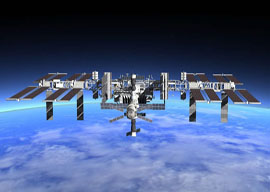
May 12, 2012

Ferrying goods, services, and personnel for the current level of government space programs will not be sufficient. Moon bases, missions to Mars, and all the rest will be necessary if the Earth’s economy is to benefit”not merely in terms of chewing up products here, but providing both new sources of raw materials and new technologies. These in turn will create all sorts of unsettling changes here. An end to the necessity of fossil fuel, for example, would radically alter the terrestrial economic and power structure.
It will lie with government to lead the way in translunar exploration. NASA is hoping to use the money saved on those tasks farmed out to private enterprise to do just that. But it takes a long time using modern rocket technology to get to, say, Mars”and 24 months in space will wreak havoc with human bones and human psychology. A more realistic and shorter way to do the job would probably be using atomic energy à la the late lamented Project Orion or some other energy scheme such as the so-called MagBeam Propulsion, whose advocates claim would allow a manned team to reach the Red Planet in 90 days.
Funding for these schemes would be horribly expensive”probably beyond any one nation’s exchequers, including our own. The politicking required would be nearly superhuman. But if the IST’s current governmental sponsors (Canada, Europe, Japan, Russia, and the United States) continue to cooperate, they might be able to swing it”especially if they can pick up one or two more partners such as China and India.
But from a purely material aspect the alternatives are far worse, whether or not a World War is included among them. It may well be that economic and social collapse are what we need, spiritually speaking”as with the fall of Babel. The sea of stars awaits.